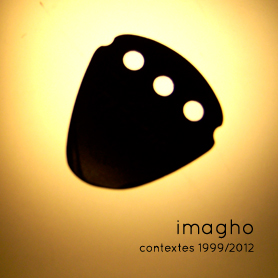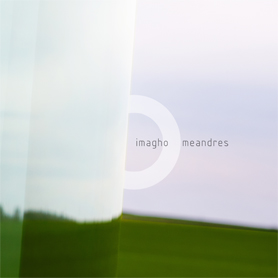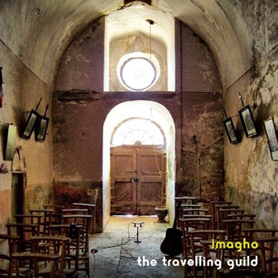
Randy Branch
Imagho is french guitarist from Lyon, France, JL Prades' solo project since 1997. From 2000 to 2014, 5 LPs, 2 EPs and 3 collaborative LP were issued, along with a dozen appearances on compilations. He tours France since 2011, alone on stage, with his guitar and a few pedals and, most recently, his voice.
What led you to choose the guitar for your own musical expression?
When I was a teenager, I was into heavy metal (I was 13 in 1982) and dreamed of playing drums. I took lessons and bought a small kit. But one night I dreamed that I played Van Halen’s « Eruption » in a guitar shop and that my friends were astonished. The next day I knew I would be a guitarist, and soon I bought my first electric guitar. I never managed to play « Eruption », though (and never dreamt I played drums, too, so I must have made the right choice).
Was there a particular guitarist, other musician, movie, art, sound, life event that caused you to hear music differently?
At this time I mostly revered Eddie Van Halen. I remember making a tape of all his solos, maybe 20 or 25 minutes of solos from all VH’s records I owned. Songs did not matter at all to me back then so I eventually got rid of them and just kept his solos. He is the very first in my « life changing musicians » list. Next one is Pat Metheny, whom I saw on TV one summer night when I was 18, playing Horace Silver’s « lonely woman » with Charlie Haden and Billy Higgins, then jumping to a free version of « The calling », complete with guitar synths and feedback. That opened me to Jazz, and, even more important, showed me that there were other musics worth listening outside of Hard Rock and Heavy Metal. Next one was Robert Fripp. I remember that I loved King Crimson the night I discovered it but was even more astonished by his work with Eno, the Frippertronics stuff. Then it was Bill Frisell, whom I first heard with Power Tools, Fred Frith's ("Step across the Border" OST), and eventually Sonic Youth’s golden pair, Thurston Moore + Lee Ranaldo. These are the guitarists who opened the various paths I love to dwell on. As I am not only a guitarist but a musician, if I had to chose a single musician who changed the way I hear and think music, it would be Claude Debussy.
What specifically about that appealed to you?
I love the fact that his music is unpredictable, and his refusal of all the rules that he was due to follow when he was learning music. He once said « les règles ne font pas les oeuvres d’art » (« rules do not make art »). For most critics, Modern music starts with the « prelude à l’après midi d’un faune » he wrote in 1894. Almost all the music I love has a connexion to it. He thought of the orchestra as a whole machine able to produce almost any sound, not as a combination of various groups (reeds, strings, percussions…), exactly as we can think of the studio nowadays. He had a broader view than all his contemporaries and could write colorful chordal music giving it the shape he wanted to.
As you were trying to find your way, were there particular sounds or gear that helped you to achieve your sound?
As you were trying to find your way, were there particular sounds or gear that helped you to achieve your sound?
My first band was a hard-rock band. I used little to no effects, and had those years generic sound, a Boss distortion pedal in a Peavey solid-state amp. When we disbanded, I began to play alone, at the end of the 80’s, and became more and more attracted by guitarists whose sound was far from what you would think a guitar sound should be. This started with Andy Summers, Robert Fripp, and Adrian Belew. At the age of 18, I was given a Boss ME5, a multi-effect that was the state of the art back then. I used it to alter my guitar sound using strange choruses or flangers, long reverbs, long delays, and started playing with a volume pedal, creating thick layers of sound or rhythmic patterns using delays. I remember soloing in a jazz unit I played with, using a huge overdriven sound and changing chorus/flange patterns every 2 or 3 seconds, like Adrian Belew did in Talking Heads « remain in light »… The next big step was loopers. I first bought a pair of Akai Headrush, allowing me to loop in stereo, then a Line 6 echo pro, and now I have the EHX 2880, a four tracks looper. I never thought of playing live alone before the 2880, and when I got it it was an epiphany. I soon discovered that I could loop many things on stage, not just the guitar, and ended up looping organ, drums, voice, using it as a portative studio. It really helped me shape the music I play on stage. It eventually helped me become self confident enough to get rid of it and play gigs alone, just one guitar and no loops or treatments whatsoever.
I did it a couple of times with my acoustic guitar, and plan to do it with an electric guitar too, just the guitar, a cable and my beloved Fender Bandmaster stack. This amp really defined my sound. I could not play on anything except a vintage Fender tube amp anymore. The last important thing that defined my sound is when I decided to use righty guitars. I’m a lefty, and for the 20 first years I played regular left-handed models. Then one day I was at a friends, picked a right handed guitar that was there and started strumming, holding it like I always did, thus having the strings reversed (lower E string on the bottom). I thought that was cool because many ideas came to me. Back home I reversed the string on one of my guitars to see if those ideas could become tunes, and they did. For one year or two I played the two ways, then I switched to right-handed guitars exclusively and sold all my leftys. If you look at recent pictures of me you’ll see me using only right-handed guitars now. This changed my whole playing, from sound (chords are strummed backwards, from high to low notes) to notes and scales and arpeggios…
I did it a couple of times with my acoustic guitar, and plan to do it with an electric guitar too, just the guitar, a cable and my beloved Fender Bandmaster stack. This amp really defined my sound. I could not play on anything except a vintage Fender tube amp anymore. The last important thing that defined my sound is when I decided to use righty guitars. I’m a lefty, and for the 20 first years I played regular left-handed models. Then one day I was at a friends, picked a right handed guitar that was there and started strumming, holding it like I always did, thus having the strings reversed (lower E string on the bottom). I thought that was cool because many ideas came to me. Back home I reversed the string on one of my guitars to see if those ideas could become tunes, and they did. For one year or two I played the two ways, then I switched to right-handed guitars exclusively and sold all my leftys. If you look at recent pictures of me you’ll see me using only right-handed guitars now. This changed my whole playing, from sound (chords are strummed backwards, from high to low notes) to notes and scales and arpeggios…
Can you give an example of your work where it (pedal or technique) is being utilized?
How have you been able to build upon those early experiences to what you’re doing now?
At one time in my life I discovered that I never had enough music. I played in bands but was never satisfied by the schedule, I always wanted more rehearsals, more playing, more music. I finally bought a 4 tracks tape recorder and started making music alone, on an everyday basis. This is how everything started: I thought I would use it to create songs I could play with my bands, or work on songs we had, but from the first day I created music I did not know I had in my mind and hands. This 4 tracks recorder opened me to my own music. I soon gathered the first tunes I made with it, and chose a name for it before sending cassettes to a few people. They all loved it and I soon had proposals for recording my first album. Isolation is the key to what I’m doing now. Without it I would never have discovered my own music.
These tracks are from my next album.
This is a very difficult question. It’s not really a matter of sound. I have a few guitars I love: my 60’s italian Galanti Jetstar, my Fender Pawnshop Jaguar, my DeArmond X155 and a cool korean Epiphone Casino. Except for the Galanti, I would be pleased to trade each one of those for a better sounding model: a 60’s Jaguar for the pawnshop, a Gibson ES330 for the Casino… But to be fair they all sound good to me and that would maybe just be a geek’s thing. I have a 1968 Fender amp with a rich, full and silky sound I’m in love with. And, when it comes to acoustic, I own a 70’s Guild D25M dreadnought with whom I fell in love the second I played it.
So I can say that I have all the sounds I want to play with. Sonically it’s ok. It’s musically that I’m never satisfied: everytime I finish a song or a record I think I could/should have done better, and work to improve my musicianship. I’m not talking about being a better guitarist, with better skills but about being able to express myself fully. We all have those moments when we feel we are good at what we play, when the connection between what you want to play and what you deliver is strong, especially when improvising. My secret goal is to feel this every single time I play, and not only at home but onstage too. I hope to play at the top of my possibility, on an emotional level, every single time I play, was it in the studio, for my pleasure at home, or on stage. Bill Frisell is the musician I would love to be, putting all his soul into every note, always accurate yet never rigid, and a great improviser. This is what I would like to achieve.
What can we expect to hear from you in the future?

If readers are interested in checking out your work further, where can we direct them?
Everyone is a guest on my website, but alas, it’s mostly in french. I have two bandcamp pages. One for a compilation that everyone can stream and/or download at free price, displaying my favorite Imagho tracks. Another, where all my records are available for streaming and downloading. Some can be bought on CDs or vinyl.
Thank you very much for your time and participation in Tune Hear.
In closing, one final fun question:
If you had an opportunity to ask any guitar player a question, who would it be and what would you ask?
Maybe I would ask Eddie Van Halen if he can come home and teach me "Eruption"...

albums
Welcome to Tune Hear!
This is a weekly series to be hosted by Prepared Guitar. It is my hope that the following information would not only highlight the artist, their techniques, and their musical endeavors, but also cause others to reach for their own goals in a realistic way. It is my hope that this will be an international site where guitarists worldwide would not only have the opportunity to listen but also be motivated and inspired to follow their dreams.
Send US your PROJECTS, and let us accompany your dreams.
We look forward to an international partnership where music, especially guitar oriented, is shared and enjoyed by a wider audience.
So TUNE HEAR for your sonic journey!!








